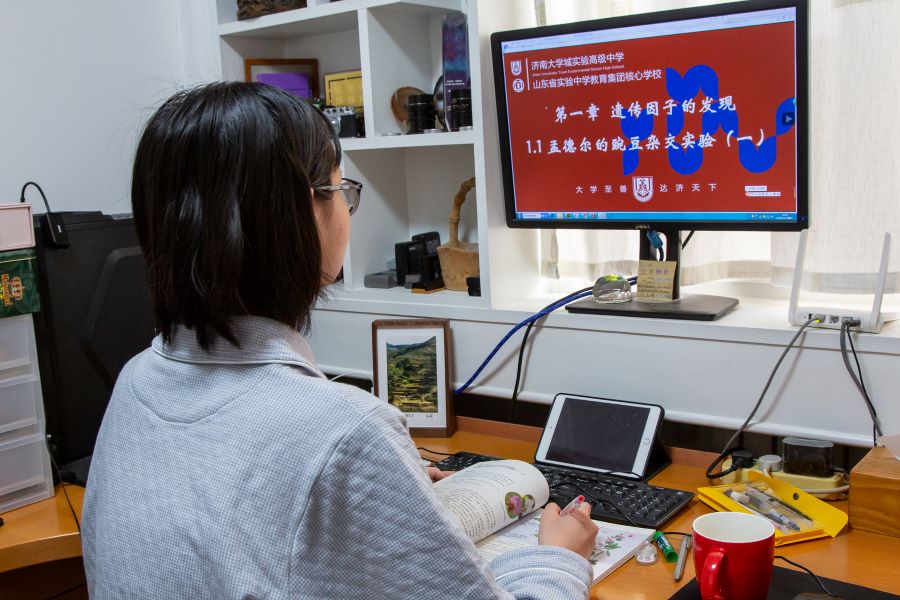Spark Education Launches IPO Into Regulatory Storm

Looming crackdown aimed at easing pressure on students could force online small-class specialist to slash its fundraising plans
Key points:
- Despite its rapid growth, Spark Education’s IPO is likely to get most scrutinized for its comments about China’s looming crackdown on extracurricular educators
- Regulatory uncertainty could force the company to slash its fundraising target by about half
By Doug Young
Talk about bad timing.
Online education specialist Spark Education Ltd. has just filed its prospectus for a New York IPO that would look quite attractive if not for a huge regulatory uncertainty now facing the sector. That uncertainty has seen increasingly loud signals coming from Beijing saying that Chinese students are too stressed out by the huge amount of extracurricular classes many are forced to take by parents obsessed with their education.
We’ll detail the latest on that brewing storm shortly, as it’s covered quite thoroughly in the “risks” section of Spark’s IPO prospectus, which was filed Monday in the U.S.
A good example of the huge headwinds Spark could face comes from Zhangmen Education Inc. (NYSE: ZME), another extracurricular education specialist that listed in New York earlier this month and has now traded for about two weeks.
Zhangmen initially hoped to raise about $100 million, which is a typical “placeholder” amount given in a company’s first prospectus to be updated after it gages market demand. While most such figures have been sharply upsized in recent new listings by Chinese tech firms, Zhangmen notably downsized its target by about half.
The company ultimately raised an unimpressive $42 million, selling its American depositary shares (ADSs) at $11.50, giving it a market value of about $1.8 billion. After a first-day surge of nearly 50%, the shares have moved steadily downward and last closed at $12.64, or up about 10% from their IPO price.
All that said, let’s jump straight into the regulatory issues that are hanging like a huge cloud over a sector that has experienced explosive growth over the last decade. That growth has been the product of a perfect storm whose elements include a booming economy that has given China’s growing middle class plenty of discretionary income to spend on this kind of service.
At the same time, advances in technology have made online learning attractive since classes can be offered at a wider range of times and on many more subjects, bringing together students and teachers separated by big geographic distances. Lastly, there’s the huge importance Chinese society places on education, which means that parents are more than willing to spend lavishly on extracurricular courses to give their children a competitive edge.
That perfect storm has placed huge pressure on China’s children, whose after-school hours and weekends are often crammed with courses on a wide range of subjects, from basics like math and English to less essential items like art and calligraphy.
All of that has led the central government to step in and roll out new policies aimed at reining in the industry. Spark quietly alludes to the regulatory issue as the eighth out of eight items in the section of its prospectus titled “risks related to our business and industry.” It delves into a more detailed discussion on that risk later in the prospectus.
Private Education Law
Most of the uncertainty revolves around a new Private Education Law, which was promulgated on April 7 this year and will take effect on Sept. 1, the prospectus says. That law will require all after-school tutoring companies to get permits, even though it doesn’t “specify the requirements that an online tutoring service provider like us need to satisfy in order to obtain a private school operating permit,” the prospectus adds.
Another problematic subject involves the word “aggravate,” since another recently modified law on the protection of minors specifies that “schools may not organize collective remedial lessons … during national statutory holidays, weekends, winter and summer vacations to aggravate (students’) academic burden,” the prospectus says. It points out there is no way to determine yet what programs might be considered as “aggravating the after-school academic burden on students.”
With all those clouds overhead, it’s hard to focus on the company’s actual financial performance. But we’ll try to do that anyhow in the remainder of this space, as Spark certainly seems to be doing fairly well in the extremely crowded sector.
The company is a relative newcomer to online education, serving up its first courses in early 2018. It bills itself as a specialist in small online classes with typical sizes of four to eight students, with a primary focus on the three subjects of math, English and Chinese. That looks quite focused compared with many of the other companies out there, and the limits on class size might also appeal to parents trying to choose which company best meets their child’s needs.
Its relatively short life means the company has posted impressive-looking revenue growth, including a sixfold jump to 1.17 billion yuan ($181 million) last year from 195 million yuan in 2019. The growth rate slowed by about half to a threefold increase in this year’s first quarter, reaching 454 million. Such a slowdown is inevitable as the company gains size.
Spark’s student body also increased about threefold to 370,530 by the end of March, versus 133,902 a year earlier. And in an encouraging sign, its revenue per course unit grew nearly 10% to 76.6 yuan over that period, indicating it’s becoming more efficient as its student volume grows.
Its net loss also grew to 374 million yuan in this year’s first quarter from a 209 million yuan loss a year earlier. But again, it’s noteworthy that the loss grew at a far slower rate than the threefold increase in revenue over the same period.
In terms of valuation, the money-losing industry now trades at a price-to-sales (P/S) multiple of around 5, which would value Spark Education at about $900 million based on its 2020 sales. But most of these education stocks are quite beaten down lately due to all the regulatory concerns. Shares of Hong Kong-listed Koolearn are representative of the group, having lost more than half their value this year.
That halving figure could well represent a trend for the broader sector, meaning Spark’s final fundraising total could follow Zhangmen’s and end up getting downsized from the initial $100 million placeholder to a final figure closer to around $50 million.
To subscribe to Bamboo Works weekly newsletter, click here





